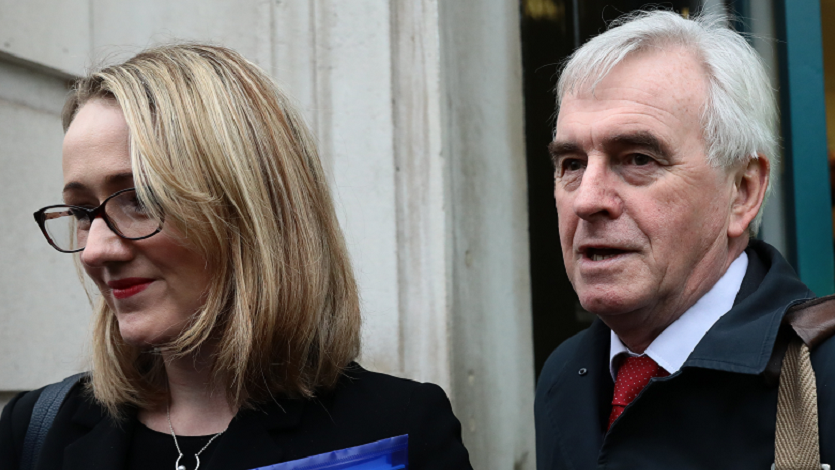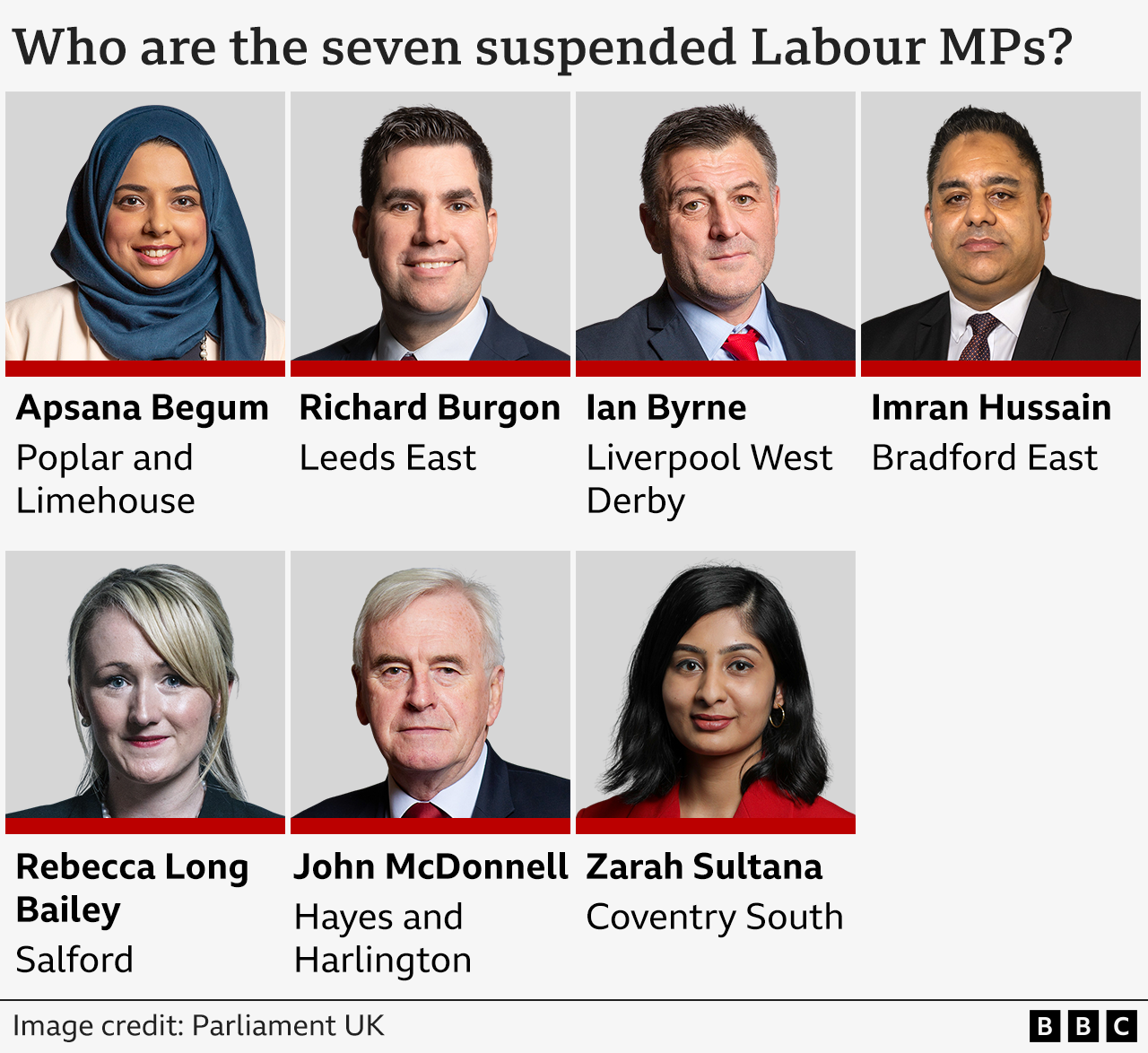Labour suspends seven rebel MPs over two-child benefit cap

Former shadow ministers Rebecca Long-Bailey and John McDonnell, who served on Jeremy Corbyn's front bench, were among the seven voting against the government
- Published
Seven Labour MPs have had the whip suspended for six months after voting against the government on an amendment to scrap the two-child benefit cap.
Ex-shadow chancellor John McDonnell was among the Labour MPs who voted for an SNP motion calling for an end to the policy, which prevents almost all parents from claiming Universal Credit or child tax credit for more than two children.
Mr McDonnell backed the SNP motion alongside Richard Burgon, Ian Byrne, Rebecca Long-Bailey, Imran Hussain, Apsana Begum and Zarah Sultana.
MPs rejected the SNP amendment by 363 votes to 103, in the first major test of the new Labour government’s authority.
Why is there fresh controversy over the two-child benefit cap?
- Published11 July 2024
Two-child benefit cap: ‘Every month is a struggle’
- Published31 January 2024
Chancellor resists calls to lift two-child benefit cap
- Published21 July 2024
The two-child cap, which was introduced by the Conservatives in 2017, does not apply to child benefit, a weekly payment which is made for every child someone has.
The Institute for Fiscal Studies think tank, external has estimated that removing the two-child benefit cap would eventually cost the government £3.4bn a year, roughly 3% of the total budget for working-age benefits.
Figures show, external an estimated 1.6 million children were living in families affected by the policy.
However, a recent survey by YouGov suggested, external 60% of people think the two-child limit should remain.
Losing the whip means the MPs are suspended from the parliamentary party and will now sit as independents.
Nearly all of the rebels were allies of the former Labour leader Jeremy Corbyn, who now sits as an independent MP and put his name to the SNP motion.
Ms Sultana told BBC Radio 4's Today programme she had not been informed she would lose the whip if she voted for the amendment.
However, she said this would not have changed her decision.
The MP for Coventry South told Today: "I'm not interested in playing up to this macho virility test that seems to be what people are talking about.
"It's about the material conditions of 330,000 children living in poverty.
"This isn't a game. This is about people's lives."
Mr Burgon said he was "disappointed" by the decision to suspend him, while Ms Begum said she had voted against the cap because it had "contributed to rising and deepening levels of child poverty and food insecurity for many East End families".
Mr Byrne, meanwhile, said the "best way" to help his Liverpool West Derby constituents living in poverty was to scrap the cap.
Before the vote, Mr McDonnell said: "I don't like voting for other parties' amendments, but I'm following Keir Starmer's example as he said put country before party."
However, Jonathan Ashworth, a former Labour shadow cabinet member and key figure in the party's election campaign, said voting for the amendment was "a futile gesture".
Mr Ashworth, who unexpectedly lost his seat in the election to an independent pro-Gaza candidate, told the BBC: "The government is not unsympathetic to the cause.
"It has announced a child poverty review. The right way to effect change is not the parliamentary games of last night, but to engage with that review."
The decision to remove the whip is an early show of force from the new government in the face of its first rebellion.
Even though it was a small one, Labour whips are trying to send a message to MPs that dissent will not be tolerated in votes.
However, there are many more Labour MPs who are opposed to the cap and hope the party will make a decision in the coming months to scrap it.
The government has said it is not prepared to make "unfunded promises" by abolishing the cap.
Sir Keir Starmer was challenged by SNP MPs over the issue during Prime Minister's Questions.
In response he pointed to the government's new child poverty taskforce and plans to introduce free breakfast clubs in primary schools as evidence of his commitment to lifting children out of poverty.
Meanwhile, five independent MPs who also support scrapping the cap, including Mr Corbyn, have said they are "looking forward to working closely" with the seven ex-Labour MPs who have been suspended.
"As independent members of Parliament, we welcome more members in Parliament who are free to speak out against inequality and injustice without fear of repercussion from their party whip," they said in a letter to the seven MPs.

Kim Johnson and Rosie Duffield were among 19 Labour MPs to sign another amendment calling for an end to the cap, which was not put to a vote.
Several prominent critics of the cap, including Ian Lavery and Nadia Whittome, who both signed rebel amendments, abstained.
Labour veteran and Mother of the House Diane Abbott did not take part in the vote due to "personal reasons" but in a statement said she was "horrified" MPs had been suspended "when removing the cap is supposed to be party policy".
Emma Lewell-Buck, Labour MP for South Shields, who put her name to a rebel amendment, said she did not vote against the government because "none of the votes taking place tonight would have resulted in scrapping the cap".
In a social media post , externalshe said: "There will be an Autumn Budget soon and I know myself and other colleagues will be working constructively with the government to make scrapping the cap part of it."
Despite the rebellion, Sir Keir easily saw off the first major test of his government – passing the King's Speech.
Separately Labour defeated an attempt by the Conservatives to insert an amendment to the King's Speech promoting Tory policies on defence spending, illegal migration and cutting inflation by 384 votes to 117.
A Lib Dem-tabled amendment which sought to commit the government to focus on crises in the health and social care system, sewage dumping and electoral reform was defeated by 382 votes to 85 - despite receiving support from Reform UK, the Green Party and parties from Wales and Northern Ireland.
Opposition parties customarily try to amend the King's Speech to include their priorities for the next parliament, though they almost never succeed.
Get in touch
Are you affected by the two child benefit cap?